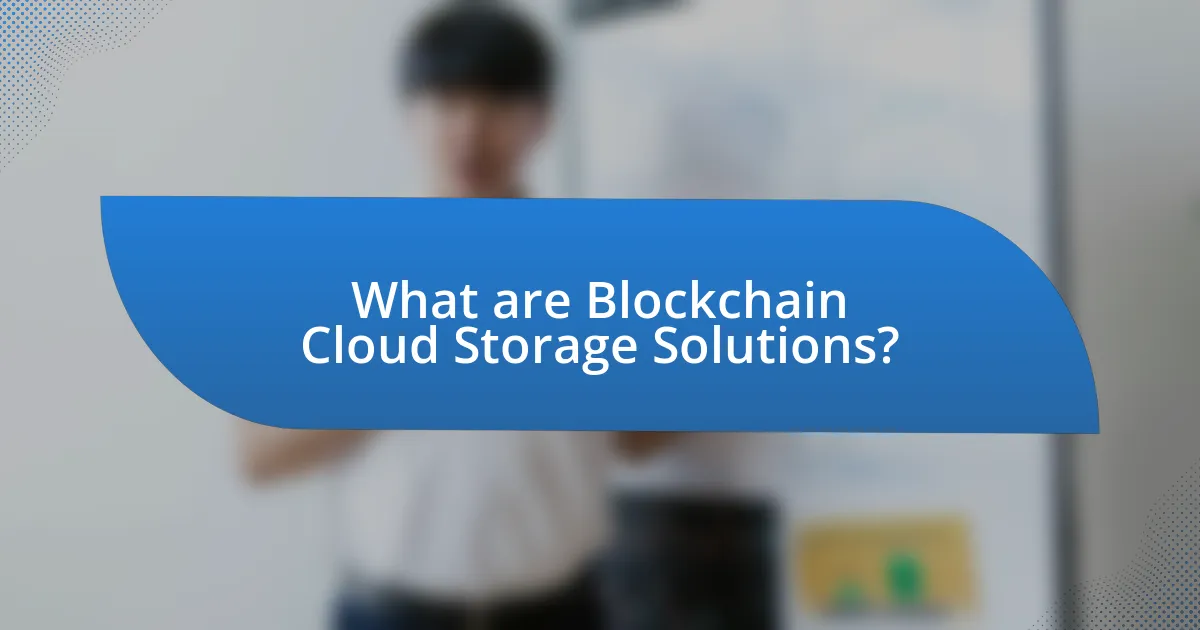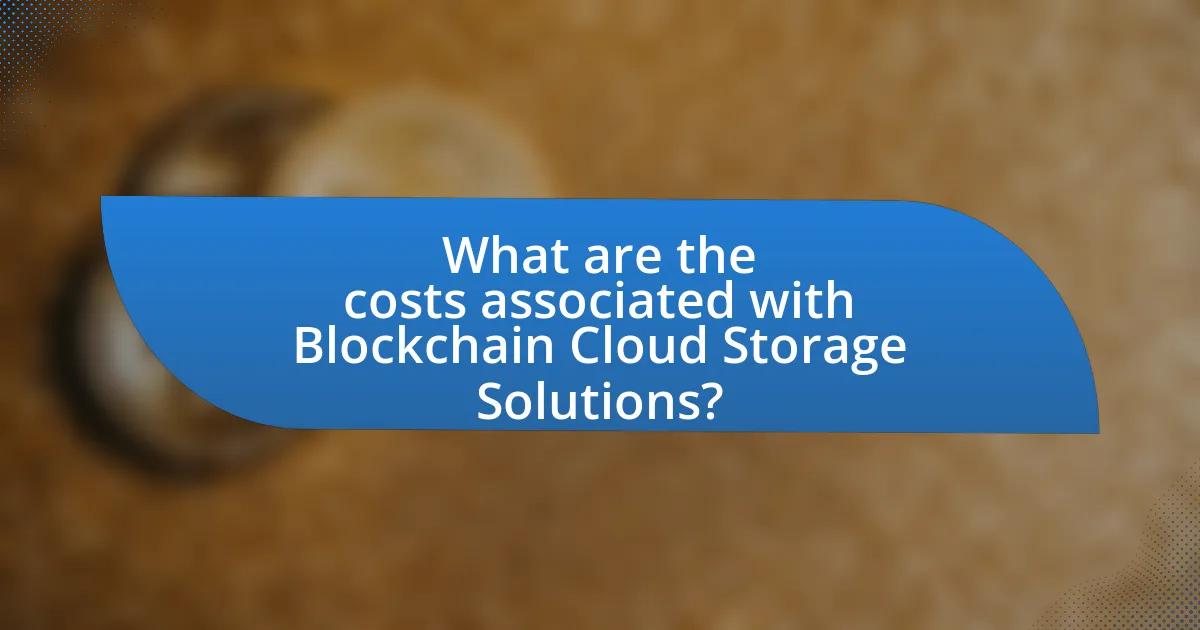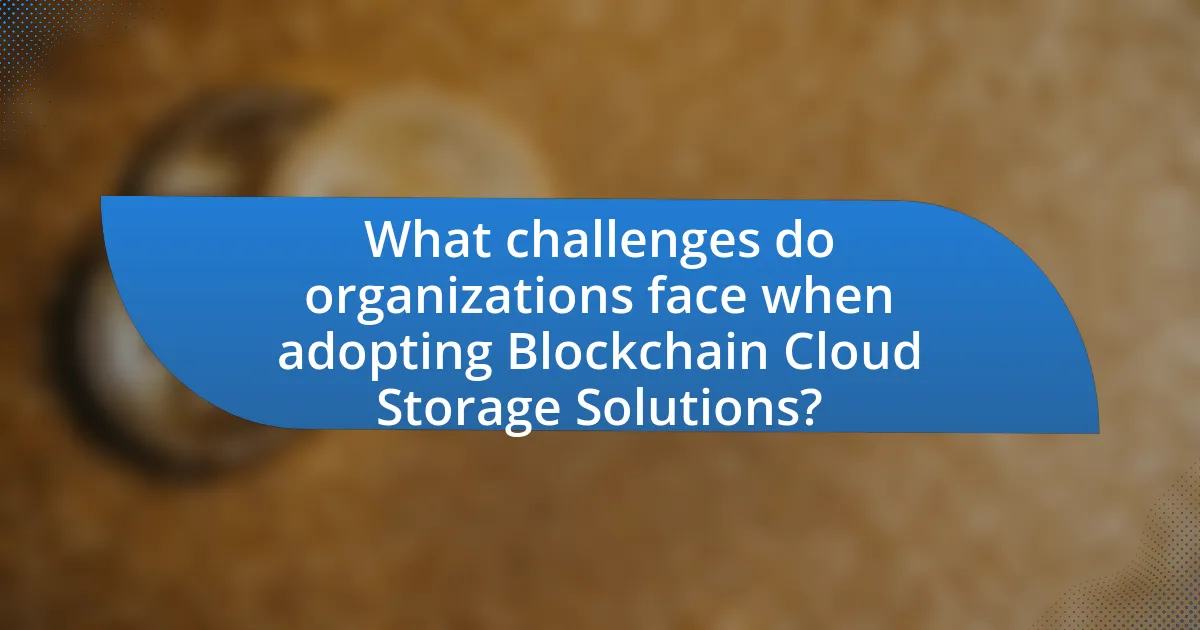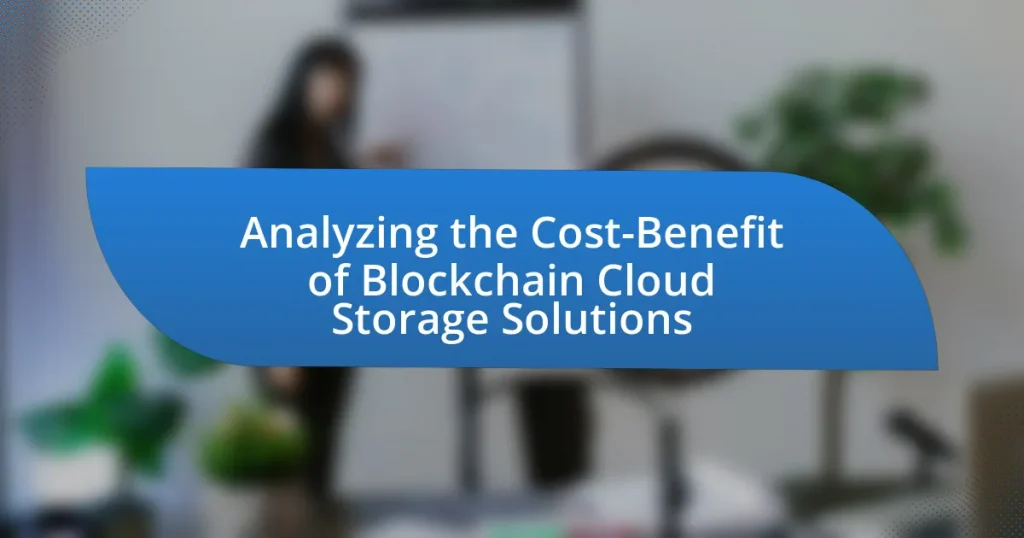Blockchain cloud storage solutions represent a decentralized approach to data storage that leverages blockchain technology for enhanced security, integrity, and transparency. This article analyzes the cost-benefit ratio of these solutions compared to traditional cloud storage, highlighting key features such as decentralization, cryptographic security, and immutable records. It discusses the potential benefits, including cost savings and improved data management, while also addressing challenges like scalability and regulatory compliance. Additionally, the article outlines best practices for implementation and integration, as well as future trends that may impact the evolution of data management in the context of blockchain technology.

What are Blockchain Cloud Storage Solutions?
Blockchain cloud storage solutions are decentralized data storage systems that utilize blockchain technology to securely store and manage data across a distributed network. These solutions enhance data security and integrity by leveraging cryptographic techniques and consensus mechanisms, which ensure that data is immutable and tamper-proof. For instance, platforms like Filecoin and Storj exemplify blockchain cloud storage by allowing users to rent out unused hard drive space while ensuring data is encrypted and distributed across multiple nodes, thus reducing the risk of data loss or unauthorized access.
How do Blockchain Cloud Storage Solutions differ from traditional cloud storage?
Blockchain cloud storage solutions differ from traditional cloud storage primarily in their decentralization and security features. Traditional cloud storage relies on centralized servers managed by a single entity, which can be vulnerable to data breaches and outages. In contrast, blockchain cloud storage distributes data across a network of nodes, enhancing security through cryptographic techniques and reducing the risk of a single point of failure. For instance, a study by the International Journal of Information Management highlights that blockchain technology can provide immutable data records, ensuring data integrity and transparency, which are not inherent in traditional systems.
What technologies underpin Blockchain Cloud Storage Solutions?
Blockchain Cloud Storage Solutions are primarily underpinned by distributed ledger technology (DLT), cryptographic algorithms, and smart contracts. Distributed ledger technology enables decentralized data storage across multiple nodes, enhancing security and redundancy. Cryptographic algorithms ensure data integrity and confidentiality by encrypting files before they are stored on the blockchain. Smart contracts automate processes and enforce agreements without intermediaries, facilitating efficient data management and transactions. These technologies collectively enhance the reliability, security, and efficiency of cloud storage solutions, making them a viable alternative to traditional storage methods.
What are the key features of Blockchain Cloud Storage Solutions?
Blockchain Cloud Storage Solutions offer key features such as decentralization, enhanced security, data integrity, and transparency. Decentralization eliminates single points of failure by distributing data across multiple nodes, reducing the risk of data loss or manipulation. Enhanced security is achieved through cryptographic techniques, ensuring that only authorized users can access the data. Data integrity is maintained via immutable records on the blockchain, which prevents unauthorized alterations. Transparency allows users to verify transactions and data access, fostering trust among stakeholders. These features collectively enhance the reliability and efficiency of data storage compared to traditional cloud solutions.
What are the potential benefits of using Blockchain Cloud Storage Solutions?
Blockchain cloud storage solutions offer enhanced security, decentralization, and data integrity. These solutions utilize cryptographic techniques to secure data, making unauthorized access significantly more difficult. Decentralization reduces reliance on a single point of failure, thereby increasing system resilience against attacks or outages. Additionally, the immutable nature of blockchain ensures that once data is recorded, it cannot be altered or deleted, providing a reliable audit trail. According to a report by Deloitte, organizations leveraging blockchain for data storage can experience a reduction in costs associated with data breaches and improved compliance with data protection regulations.
How does data security improve with Blockchain Cloud Storage Solutions?
Data security improves with Blockchain Cloud Storage Solutions through enhanced encryption, decentralized data management, and immutable records. Blockchain technology employs cryptographic algorithms to secure data, making unauthorized access extremely difficult. Additionally, the decentralized nature of blockchain means that data is not stored in a single location, reducing the risk of data breaches. Each transaction is recorded in an immutable ledger, ensuring that any alterations to data can be easily detected, thereby increasing accountability and trust. These features collectively contribute to a more secure data storage environment compared to traditional cloud storage solutions.
What cost savings can businesses expect from Blockchain Cloud Storage Solutions?
Businesses can expect significant cost savings from Blockchain Cloud Storage Solutions primarily through reduced operational costs, enhanced data security, and minimized data redundancy. By utilizing decentralized storage, companies can lower expenses associated with traditional data centers, which often require substantial investments in hardware, maintenance, and energy consumption. For instance, a study by IBM indicates that blockchain can reduce storage costs by up to 30% due to its efficient data management capabilities. Additionally, the enhanced security features of blockchain reduce the risk of data breaches, which can lead to costly legal fees and reputational damage. Furthermore, the elimination of intermediaries in data transactions streamlines processes and reduces transaction fees, contributing to overall cost efficiency.

What are the costs associated with Blockchain Cloud Storage Solutions?
The costs associated with Blockchain Cloud Storage Solutions typically include infrastructure expenses, transaction fees, and maintenance costs. Infrastructure expenses arise from the need for decentralized storage nodes, which can vary based on the provider and the level of redundancy required. Transaction fees are incurred for data uploads and retrievals on the blockchain, often influenced by network congestion and the specific blockchain protocol used. Maintenance costs involve ongoing expenses for software updates, security measures, and operational management of the storage system. According to a report by Deloitte, the total cost of ownership for blockchain solutions can be significantly higher than traditional cloud storage due to these factors, emphasizing the need for careful cost-benefit analysis.
What initial investments are required for implementing Blockchain Cloud Storage?
Implementing Blockchain Cloud Storage requires initial investments in infrastructure, software development, and security measures. Specifically, organizations need to invest in decentralized storage infrastructure, which may include purchasing or leasing servers and storage devices that support blockchain technology. Additionally, software development costs arise from creating or customizing blockchain applications tailored to specific storage needs, which can range from tens of thousands to millions of dollars depending on complexity. Security measures, including encryption technologies and compliance with regulations, also necessitate financial resources, as ensuring data integrity and privacy is critical in blockchain implementations. These investments are essential for establishing a robust and efficient blockchain cloud storage solution.
How do operational costs compare to traditional storage solutions?
Operational costs for blockchain cloud storage solutions are generally lower than those for traditional storage solutions. Traditional storage often incurs high maintenance, hardware, and energy costs, while blockchain cloud storage minimizes these expenses through decentralized architecture and reduced reliance on physical infrastructure. For instance, a study by Gartner indicates that organizations can save up to 30% on storage costs by adopting cloud-based solutions compared to on-premises systems. This cost efficiency is primarily due to the elimination of physical hardware and the scalability of cloud services, which allows businesses to pay only for the storage they use.
What hidden costs should businesses be aware of?
Businesses should be aware of hidden costs such as data migration expenses, ongoing maintenance fees, and potential compliance costs associated with blockchain cloud storage solutions. Data migration can incur significant costs due to the complexity of transferring existing data to a new system, often requiring specialized expertise. Ongoing maintenance fees may arise from the need for continuous updates and support for the blockchain infrastructure, which can be more expensive than traditional cloud solutions. Additionally, compliance costs can emerge from adhering to regulatory requirements specific to blockchain technology, which may necessitate legal consultations and audits. These factors collectively contribute to the total cost of ownership, making it essential for businesses to conduct thorough financial assessments before implementation.
How do the costs and benefits of Blockchain Cloud Storage Solutions compare?
The costs of Blockchain Cloud Storage Solutions generally include higher initial setup expenses and ongoing transaction fees, while the benefits encompass enhanced security, data integrity, and decentralized control. For instance, a study by Deloitte highlights that blockchain technology can reduce data breaches by up to 50%, providing significant long-term savings despite the higher upfront costs. Additionally, the decentralized nature of blockchain mitigates risks associated with single points of failure, which traditional cloud storage solutions face. Thus, while costs may be elevated initially, the long-term benefits in security and reliability can outweigh these expenses.
What metrics can be used to evaluate the cost-benefit ratio?
Metrics used to evaluate the cost-benefit ratio include Net Present Value (NPV), Return on Investment (ROI), Payback Period, and Internal Rate of Return (IRR). NPV calculates the difference between the present value of cash inflows and outflows, providing a clear indication of profitability over time. ROI measures the gain or loss generated relative to the investment cost, expressed as a percentage. The Payback Period assesses how long it takes to recover the initial investment, while IRR represents the discount rate that makes the NPV of all cash flows equal to zero, indicating the efficiency of the investment. These metrics are essential for making informed decisions regarding blockchain cloud storage solutions, as they quantify the financial implications and help compare different investment opportunities.
How can businesses measure the return on investment (ROI) for Blockchain Cloud Storage?
Businesses can measure the return on investment (ROI) for Blockchain Cloud Storage by calculating the cost savings and revenue increases attributed to its implementation. This involves assessing factors such as reduced data storage costs, enhanced security leading to lower breach-related expenses, and improved operational efficiency that can result in higher productivity. For instance, a study by Deloitte found that organizations using blockchain technology can reduce data management costs by up to 30%, which directly impacts ROI. Additionally, businesses can track metrics such as time saved in data retrieval and transaction processing speeds, which contribute to overall financial performance. By comparing these benefits against the initial investment and ongoing operational costs, businesses can derive a clear ROI figure.

What challenges do organizations face when adopting Blockchain Cloud Storage Solutions?
Organizations face several challenges when adopting Blockchain Cloud Storage Solutions, including scalability issues, regulatory compliance, and integration with existing systems. Scalability is a significant concern as blockchain networks can become congested, leading to slower transaction speeds and higher costs. Regulatory compliance poses challenges due to the evolving legal landscape surrounding data storage and privacy, which varies by jurisdiction. Additionally, integrating blockchain solutions with legacy systems can be complex and resource-intensive, often requiring substantial changes to existing infrastructure. These challenges can hinder the effective implementation and utilization of blockchain cloud storage solutions.
What technical challenges must be addressed during implementation?
During the implementation of blockchain cloud storage solutions, several technical challenges must be addressed, including scalability, data privacy, and interoperability. Scalability issues arise as blockchain networks can struggle to handle large volumes of transactions efficiently, which is critical for cloud storage applications that require high throughput. Data privacy concerns are paramount, as sensitive information stored on a blockchain must be protected from unauthorized access while still allowing for necessary transparency. Interoperability challenges occur when integrating blockchain systems with existing cloud infrastructure and other blockchain networks, necessitating standardized protocols to ensure seamless communication and data exchange. Addressing these challenges is essential for the successful deployment and adoption of blockchain cloud storage solutions.
How can organizations overcome scalability issues with Blockchain Cloud Storage?
Organizations can overcome scalability issues with Blockchain Cloud Storage by implementing sharding, utilizing off-chain storage solutions, and optimizing consensus mechanisms. Sharding allows data to be divided into smaller, manageable pieces, which can be processed simultaneously, thus enhancing throughput. Off-chain storage solutions, such as IPFS or Filecoin, enable organizations to store large files outside the blockchain while maintaining a reference on-chain, reducing the load on the blockchain itself. Additionally, optimizing consensus mechanisms, like transitioning from proof-of-work to proof-of-stake, can significantly increase transaction speeds and reduce energy consumption, further addressing scalability challenges. These strategies have been validated by various case studies demonstrating improved performance and efficiency in blockchain applications.
What regulatory considerations should organizations keep in mind?
Organizations should keep in mind data protection regulations, such as the General Data Protection Regulation (GDPR) in Europe and the Health Insurance Portability and Accountability Act (HIPAA) in the United States. Compliance with these regulations is crucial as they dictate how organizations must handle personal data, including storage, processing, and sharing. For instance, GDPR mandates that organizations implement appropriate technical and organizational measures to protect personal data, with penalties for non-compliance reaching up to 4% of annual global turnover or €20 million, whichever is higher. Additionally, organizations must consider industry-specific regulations that may impact their blockchain cloud storage solutions, ensuring that they meet all legal requirements to avoid legal repercussions and maintain consumer trust.
What are the best practices for maximizing the benefits of Blockchain Cloud Storage Solutions?
To maximize the benefits of Blockchain Cloud Storage Solutions, organizations should implement a multi-layered security approach, utilize decentralized storage protocols, and ensure compliance with relevant regulations. A multi-layered security approach enhances data integrity and confidentiality by employing encryption, access controls, and regular audits. Utilizing decentralized storage protocols, such as IPFS or Filecoin, allows for improved data redundancy and availability, reducing the risk of data loss. Compliance with regulations, such as GDPR or HIPAA, ensures that organizations protect sensitive information and avoid legal penalties. These practices collectively enhance the efficiency, security, and reliability of blockchain cloud storage solutions, leading to better overall performance and user trust.
How can organizations effectively integrate Blockchain Cloud Storage into their existing systems?
Organizations can effectively integrate Blockchain Cloud Storage into their existing systems by adopting a phased approach that includes assessing current infrastructure, selecting compatible blockchain platforms, and ensuring data interoperability. This integration process begins with a thorough evaluation of existing data management systems to identify areas where blockchain can enhance security and transparency.
Next, organizations should choose a blockchain platform that aligns with their operational needs, such as Ethereum or Hyperledger, which offer various functionalities suitable for cloud storage applications. Ensuring data interoperability is crucial; organizations must implement APIs and middleware that facilitate seamless communication between traditional systems and blockchain networks.
Additionally, training staff on blockchain technology and its implications for data management is essential for successful integration. According to a report by Deloitte, 39% of organizations that have adopted blockchain technology cite improved data security as a significant benefit, reinforcing the value of integrating blockchain cloud storage solutions.
What strategies can enhance user adoption of Blockchain Cloud Storage Solutions?
To enhance user adoption of Blockchain Cloud Storage Solutions, implementing user-friendly interfaces and providing comprehensive educational resources are essential strategies. User-friendly interfaces simplify the interaction with complex blockchain technology, making it accessible to a broader audience. For instance, platforms like Filecoin and Storj have successfully integrated intuitive designs that facilitate ease of use. Additionally, educational resources, such as tutorials and webinars, can demystify blockchain concepts, helping potential users understand the benefits and functionalities of these solutions. Research indicates that 70% of users are more likely to adopt new technology when they receive adequate training and support, highlighting the importance of these strategies in driving adoption.
What future trends should organizations consider regarding Blockchain Cloud Storage Solutions?
Organizations should consider the increasing integration of artificial intelligence with Blockchain Cloud Storage Solutions as a future trend. This integration enhances data management and security by automating processes and improving data retrieval efficiency. Additionally, the rise of decentralized finance (DeFi) is expected to drive demand for secure storage solutions, as organizations seek to protect sensitive financial data on blockchain networks. Furthermore, regulatory compliance will become more critical, prompting organizations to adopt blockchain storage that ensures data integrity and traceability, aligning with evolving legal standards. These trends are supported by the growing market for blockchain technology, projected to reach $163.24 billion by 2029, indicating a robust demand for innovative storage solutions.
How might advancements in technology impact Blockchain Cloud Storage Solutions?
Advancements in technology will enhance Blockchain Cloud Storage Solutions by improving scalability, security, and efficiency. For instance, the integration of artificial intelligence can optimize data management and retrieval processes, while advancements in cryptography can bolster data security, making it more resilient against cyber threats. Additionally, the development of faster internet protocols, such as 5G, will facilitate quicker data transfers and access, thereby increasing user satisfaction and operational efficiency. These improvements are supported by industry trends indicating that enhanced technologies can reduce operational costs by up to 30% while increasing data integrity and accessibility.
What role will Blockchain Cloud Storage play in the evolution of data management?
Blockchain Cloud Storage will significantly enhance data management by providing decentralized, secure, and transparent storage solutions. This technology allows users to store data across a distributed network, reducing reliance on centralized servers and minimizing risks of data breaches. According to a report by Gartner, organizations that adopt decentralized storage solutions can reduce data management costs by up to 30% while improving data integrity and availability. Additionally, the immutable nature of blockchain ensures that data cannot be altered or deleted without consensus, thereby increasing trust and accountability in data management practices.


